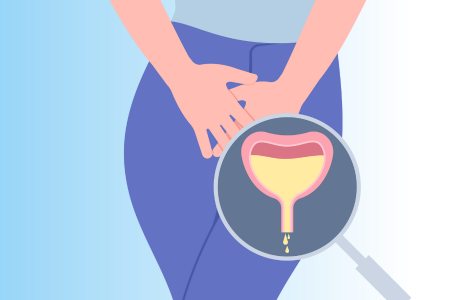
Do you find yourself suddenly needing to go to the bathroom without warning? Ever worry about socializing or spending time away from home because you’re experiencing urine leakage? Do you need to urinate more often than usual or even experience unexpected urination at night (also known as nocturia)? If so, it’s possible you may be living with a form of urinary incontinence called overactive bladder, and you’re not alone.
In fact, overactive bladder, also known as OAB, affects up to 30 percent of men and 40 percent of women. However, according to the Official Foundation of the American Urological Association, that number may be higher than reported since many people living with symptoms of urinary incontinence feel embarrassed to talk about it or see their doctor.
We’re here to help you feel informed and confident when talking to your doctor about overactive bladder. This guide answers common questions about OAB to help you understand more about this condition, its symptoms, causes, and possible treatments.
What is Overactive Bladder?
Overactive bladder is just what it sounds like: a bladder that’s working overtime.
The main symptoms of overactive bladder include:
- sudden urge to urinate
- urine leakage
- making more trips to the bathroom than before
Those living with overactive bladder may also experience secondary symptoms like:
- fatigue from disrupted sleep due to nocturia
- embarrassment
- decreased social activity
- depression
What Causes Overactive Bladder?
Aging and Gender Factors
OAB can affect anyone at any age, but age and gender often play a role. Over time, pelvic floor muscles and bladder muscles may weaken, which can lead to urine leakage. Women are more likely to experience OAB due to hormonal changes and childbirth, which are common causes of weakened pelvic muscles.
Lifestyle Triggers
Certain lifestyle factors can temporarily trigger OAB symptoms:
- Alcohol: Drinking too much alcohol can increase bladder activity and even lead to bed-wetting.
- Excess fluids: Drinking large amounts of fluids or caffeinated beverages can also lead to frequent urination.
- Bladder irritants: Caffeine, spicy foods, and acidic drinks can irritate the bladder, leading to increased urination.
If you suspect that any of these triggers are worsening your symptoms, consider adjusting your intake and speak with your doctor for tailored guidance.
Underlying Health Conditions
In some cases, chronic urinary incontinence and overactive bladder may be linked to serious health conditions. Neurological disorders like Multiple Sclerosis (MS) and Parkinson’s disease are known risk factors for OAB. Other medical conditions like diabetes and kidney disease can also contribute to OAB symptoms. If you’re experiencing ongoing symptoms, it’s important to consult a doctor to determine the underlying cause.

How is Overactive Bladder Treated?
Treatments for OAB vary, depending on the cause and severity of symptoms. Here are some commonly recommended treatment options:
Lifestyle and Dietary Modifications
Your doctor may suggest dietary changes, like reducing caffeine or acidic foods. Drinking the right amount of fluids is also essential to avoid dehydration.
Bladder Botox® Injections
Some cases of OAB can be managed by the regular injection of Botox® into the bladder’s overactive muscles.
Pelvic Floor Exercises
Strengthening your pelvic floor muscles can significantly improve bladder control. Kegel exercises may help reduce symptoms over time, as they target the muscles that support the bladder.
Prescribed Medications
If lifestyle changes aren’t enough, medication may be prescribed to reduce bladder muscle contractions.
Intermittent Catheterization
In some cases, intermittent catheters may be recommended by a healthcare professional to help manage symptoms and reduce leakage. Talk to your doctor or urologist to see what they suggest is best for your needs.
Seeking Support and Products to Manage Overactive Bladder
It’s normal to experience these kinds of symptoms, and it is perfectly alright to talk to your doctor about it. They will not judge or shame you. They’re here to help you! If you notice symptoms of an overactive bladder or other changes to your urinary system, we recommend that you schedule an appointment with your doctor as soon as possible.
If your treatment plan includes intermittent catheterization to help treat the symptoms of overactive bladder or urinary incontinence, 180 Medical is here for you every step of the way.
As the nation’s leading catheter supplier, we carry a full line of catheter products from the top catheter brands.
Our catheter specialists are ready to help you find the right catheter product for your needs and preferences. Give us a call today!
Disclaimer: This blog should not be taken as medical advice and is only intended to provide a general understanding of overactive bladder. This information should not be used in place of any recommendations, prescribed treatment plans, or medical advice from your physician.
